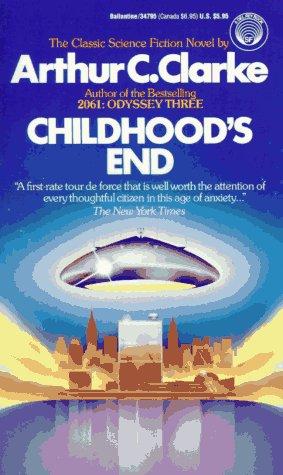Abhinav Sarkar reviewed Childhood's End by Arthur C. Clarke
Review of "Childhood's End" on 'Goodreads'
3 stars
The book starts so well. Really exciting premise, great world-building and slow and surprising reveals. But over the course of the book, its central theme changes to something which we’d not see in a good light in current age. Perhaps it’s a reflection of the time the book was written in (1953) or perhaps—like the story of the book itself—Clarke was not ready to embrace hard SciFi yet.
The plot of the book spans over a century and hence, parts of it seem somewhat disjointed. The storytelling itself is fabulous but if you have read enough of Clarke’s books, it may seem a proto-good-Arthur-C-Clarke book. The suspense and tension keeps on building over the course of chapters and ends in a great, explosive reveal and climax that gets your heart racing. However, after you are over it, the book seems like a missed opportunity—something that could have been so much …
The book starts so well. Really exciting premise, great world-building and slow and surprising reveals. But over the course of the book, its central theme changes to something which we’d not see in a good light in current age. Perhaps it’s a reflection of the time the book was written in (1953) or perhaps—like the story of the book itself—Clarke was not ready to embrace hard SciFi yet.
The plot of the book spans over a century and hence, parts of it seem somewhat disjointed. The storytelling itself is fabulous but if you have read enough of Clarke’s books, it may seem a proto-good-Arthur-C-Clarke book. The suspense and tension keeps on building over the course of chapters and ends in a great, explosive reveal and climax that gets your heart racing. However, after you are over it, the book seems like a missed opportunity—something that could have been so much better.
I think it’s unfair to judge an almost 70 year old SciFi book which talks about the 21st century, from the actual 21st century viewpoint. The author builds quite a believable future world and I found myself being surprised many times by almost-clairvoyance of the the author. There are many references to past history of humankind as well, specially about racism, cultural conflicts, and colonialism.
All in all, this book is a great view into the early career of one of the greatest SciFi authors ever. And even if you don’t like this book as much, it gives you an appreciation of the amazing skills of Arthur C Clarke as a writer.
Plot Synopsis
It’s the early 21st century and humankind has a base on moon now. Down on earth, everything is as usual; there are rich and poor, there is peace and war, there are skyscrapers and slums; nothing different from how you’d imagine the world to be. But then out of nowhere and all of a sudden, they arrive in their mighty ships. The aliens who we know nothing about, are named The Overlords by the humankind. Unlike the familiar imagined schemes of the alien-kind, they are not here to invade or take over the Earth. They are here to guide us, to nurture us. Or so they say.
Using their spectacular technological powers, they disallow wars and change the world into an utopia. Poverty and sickness is eradicated and so is the divide between rich and poor, along with all the religions of the world. Machines manufacture everything and cars fly. The human society changes a lot in next decades. People don’t need to work anymore and spend most of their lifetimes in education, traveling, entertainment and following their passions. Which mostly means sitting in their comfy home and watching a lot of TV.
Most think that this is the pinnacle of the human civilization but some disagree. The disapprovers say that humans have lost their imagination and creativity and have become mere consumers of their sensory inputs. The rebels, over the duration of many decades, try to fight against the Overlords but without any success. The rebellions are nothing in front of the unimaginable powers and intellect (and much longer lifespans) of the Overlords who mostly just ignore the rebels till they run out of steam.
The Overlords reveal themselves after fifty years of their arrival and behold, they are the devils from the human religions and mythologies. Well, they look like the devils of human imaginations, with their horns, leathery wings, and preference for darkness. But humankind has become much more tolerant by now and they accept the devil Overlords for what they are and not what they seem. The world is at peace with their rulers/guides. Except some next-gen rebels.
These next-generation rebels are unlike the previous ones. They don’t want to fight the Overlords or to drive them away. They just want to restore the old-and-lost glory of humankind in arts and crafts. They create an isolated colony on an island and name it New Athens. They gather the remaining artists from all over the world to pursue advancement of all arts such as painting, sculpture, theater, cinema and even virtual-reality video games. The Overlords don’t seem to care about them and the colony flourishes for decades. That is until a man named George Greggson comes to live in New Athens with his wife, son and daughter. And the story takes an unimaginable turn here which I’ll not write about to preserve the suspense.

